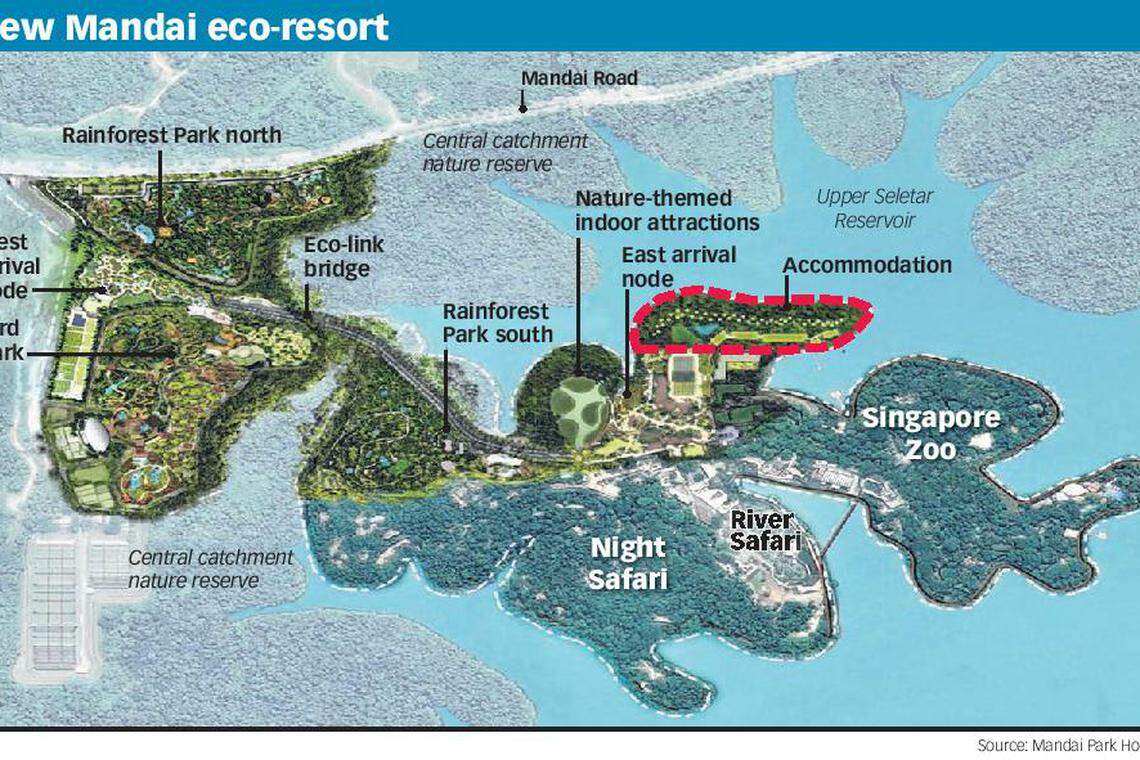Banyan Tree marks homecoming with resort in Mandai
It is picked from among eight hotel chains to be part of Mandai's integrated nature and wildlife hub, comprising the zoo and other nature parks
Singapore
SINGAPORE hospitality group Banyan Tree Holdings will open its first Singapore resort on a 4.6-hectare site near the Singapore Zoo in Mandai by 2023.
This comes after more than two decades of searching "long and hard" for project opportunities on its home turf, including Sentosa, and not finding any.
Details of the eco-friendly Mandai resort, which has not yet been named, remain sparse, but executive chairman Ho Kwon Ping calls it Banyan Tree's "final homecoming". None of its 43 resorts across 25 countries so far are located in its home market.
The resort will be owned by Mandai Park Holdings (MPH), which is wholly-owned by Temasek Holdings, and operated by Banyan Tree.
It will be part of a new integrated nature and wildlife project in Mandai, which includes not just the zoo, but also Night Safari, River Safari, the new Bird Park, which will open in 2020, and a Rainforest Park, to open in 2021.
Banyan Tree was picked as the operator from a field of eight hotel chains which had pitched for the project. At a media briefing, Mike Barclay, MPH group chief executive, said he felt that Banyan Tree was "very aligned" with MPH's own vision for the resort. "We were speaking the same language," he said.
The resort can be built to comprise up to 400 rooms. It will feature different accommodation types, ranging from standard and family rooms in low-rise structures to elevated cabins or treehouses enveloped in greenery.
The design and operation plans for the resort will be jointly developed by the partners, with special attention paid to environmentally sound principles. For instance, the existing tree canopies and natural topography of the area will be respected.
The resort will offer guests activities such as guided nature walks, native wildlife spotting tours, recycling workshops and educational movie screenings.

The back-of-house facilities for the existing wildlife parks - including a sewage treatment plant, animal quarantine facilities and staff quarters - now occupy the plot of land where the resort is to be built. These will soon be decommissioned and cleared to make way for the resort.
Mr Ho said: "We are tremendously proud and happy that after some 20-odd years since our founding in Singapore, this is truly our final homecoming. It's not as if there haven't been projects that we've looked at in the last 20-plus years. We looked at many projects, but you can well imagine most of them would be totally urban projects along Orchard Road or resorts ... somewhere in Sentosa."
Mr Ho said there had been opportunities both to manage existing resorts and to bid for a concession to build its own developments on Sentosa, but nothing materialised "for a variety of reasons which are specific to those specific circumstances".
"I can only say that we tried, but I think it would be honest to say it was somewhat half-hearted," he said.
But when the opportunity came to bid for the resort development at Mandai, he said he could not pass up the "once-in-a-lifetime" opportunity to be associated with the world-class attraction.
"This is transformational; it's a game changer. For us to have a resort in Sentosa is nice, but it would hardly be a game changer or transformational for Banyan Tree."
The design process with the architects will take place from next year to 2019; construction should take another 21/2 to three years.
He added that with this particular project, Banyan Tree wants to demonstrate that eco-friendliness and sustainability is not just about "15-key luxury resorts in the middle of some remote island, in the Sahara Desert, or in Kruger National Park".
"People usually associate Banyan Tree with expensive luxury resorts. That's only by necessity because of the places we operate in (because they are expensive destinations). Banyan Tree is actually much more about the totality of the experience. We are not proud of exclusivity; we are proud of inclusivity."
With the Mandai project, Banyan Tree is looking forward to creating a product with different price points so that it will be accessible to a wide range of Singaporeans and foreigners based on their spending power.
Nihat Ercan, managing director of investment sales at JLL Hotels & Hospitality Group, noted the increasing appeal eco-resorts across Asia have held for holiday-makers in recent years, given that they provide an off-the-beaten-path experience unique to each destination.
Some of these resorts also promote sustainability initiatives beyond just limiting changes of bath towels and reducing the resort's carbon footprint: They extend to giving back to local communities and sourcing local products at fair-market value - a credo which appeals to the modern traveller.
Most of Singapore's resorts are on Sentosa and the East Coast. Mr Ercan said they generally perform well, drawing demand from the corporate sector because of their accessibility to the central business district, as well as Singapore's robust "staycation" market, which supports occupancies on public holidays and weekends.
Banyan Tree shares closed flat at S$0.645 on the stock market on Wednesday.
BT is now on Telegram!
For daily updates on weekdays and specially selected content for the weekend. Subscribe to t.me/BizTimes
Companies & Markets
Hong Kong regulator to probe PwC auditing role over Evergrande
US: S&P, Dow open flat as Middle East jitters ease, Netflix weighs on Nasdaq
DBS puts 46 retail units, HDB shops on market for S$210 million
China to facilitate Hong Kong IPOs and expand Stock Connect
Global equity funds see surge in outflows as rate cut hopes fade
Gazelle Ventures makes cash offer for No Signboard shares at S$0.0021 apiece
